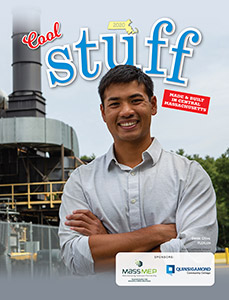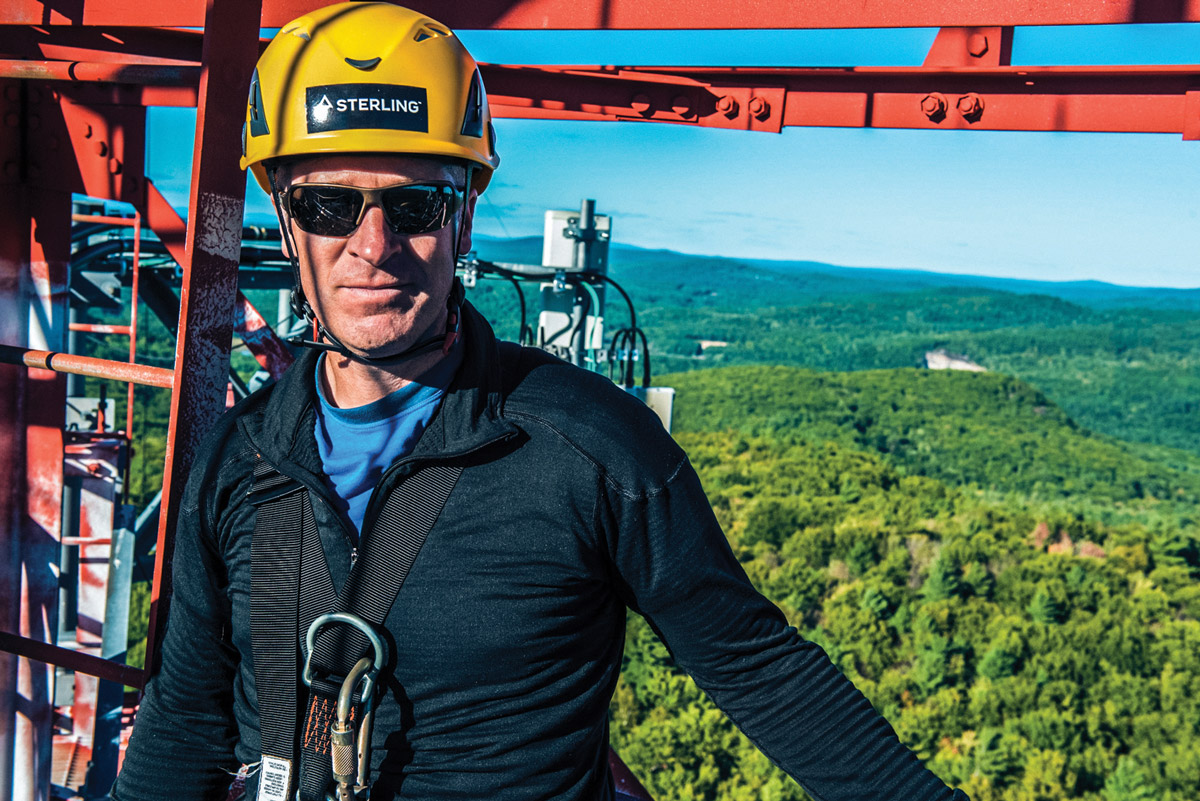
Sam Morton, sales director at Sterling Rope in Biddeford, has been with the company for 18 years.
Sam Morton
Sam Morton was passionate about rock climbing, so when he was looking for a job after college, the fact Sterling Rope had recently moved to near his home in Scarborough seemed like it was meant to be.
Morton had graduated from Maine Maritime Academy with an associate’s degree in marine management and has a bachelor of science in business administration from the University of Southern Maine. “The position I landed was handling Sterling’s specialty and OEM sales — selling rope and cord to companies that use it to build their products,” he says. “I also did some customer service and supported the other markets when needed.”
A lifelong Mainer, Morton, 44, is now sales director at the company.
He says Sterling was always a good fit. “It was a small crew of us in sales and marketing, we formed a pretty good team and it was a dynamic environment — never a lack of something to do. Traveling, working with customers, learning the industry, getting hands on training, developing new products, and meeting amazing people; the combination of all those things was pretty rewarding.”
As the company grew over the years, Morton grew with it.
“Sterling’s revenue was increasing, and we were expanding into new markets, and I was able to grow professionally as Sterling grew,” he says, adding while his career aspirations are general, “I want to continue working for a company that allows me to grow and contribute; even if I’m not exactly sure what that might be.”
The foundation for that is the fact he’s “been fortunate to work with a lot of talented and smart people through the years. I’ve seen a lot of successful small companies and while there may be some luck involved, it’s usually the people that drive the success.”
To young people starting in the market today, he’d tell that while there are often times work isn’t fun “you can create your own opportunities by hard work and being open to change.” ■
Alyssa Turnbull
Alyssa Turnbull’s advice to those starting out in the job market is, the only path you have to follow is your own, don’t be pressured by the world around you. Everyone has this great idea that you should go to high school, go to college, get a good job, buy a house, she says. Your goals are very important, but the order in which you accomplish them shouldn’t be.
Turnbull, a lab technician at Gorham wood and gas stove manufacturer Jotul North America, is a living example of that advice. She specialized in welding at Portland Arts and Technology High School, and interviewed at the company at a teacher’s urging.
She was so nervous, “I thought when I’d left that I’d blown it. I called my dad to tell him that I didn’t think I’d get the job.” While she was on the phone with him, the human resources director called and asked her if she could start the next week.
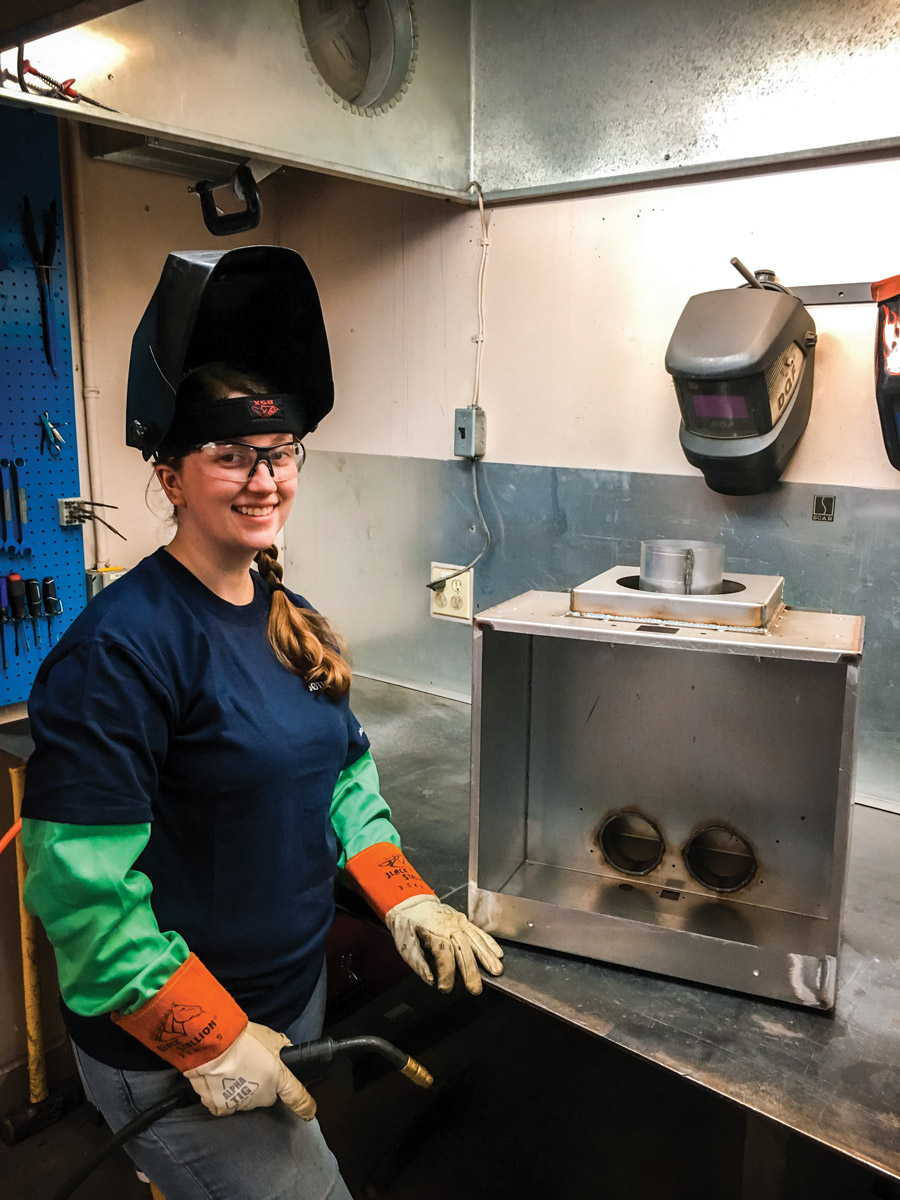
Alyssa Trumbull is a lab technician at Jotul North America.
“Don’t be afraid to get your hands dirty. A good job can help you pay for the future you have planned for yourself.”
— Alyssa Trumbull
Lab Technician, Jotul North America
She started as a temporary part-time, night-shift welder while she finished high school and took a full-time position after she graduated 10 years ago.
She thought she’d stay a welder, but that didn’t last long. “Once I learned one thing, I wanted more. I didn’t want to stop.” Turnbull moved from welding to press brake and laser operation, worked on the production line whenever she was needed, in her seventh year with the company was promoted to a documentation position in research and development, and from there became a lab tech.
She’s on her way to getting a bachelor of science in mechanical engineering. She earned an associate degree in applied science from Southern Maine Community College, and will finish her bachelor of science at the University of Southern Maine. Turnbull is also on the Society of Manufacturing Engineers Dirigo Chapter board.
“I plan to continue going to college and working to grow my career here at Jotul,” she says. She also speaks with high school students about working in manufacturing, including at the PATHs 2017 graduation ceremony.
One thing she tells them: “Don’t be afraid to get your hands dirty. A good job can help you pay for the future you have planned for yourself. Don’t be discouraged by the speed in which you accomplish your goals.”
At 28, she’s still a little surprised at how things turned out. “I’d never thought of becoming an engineer until I started learning how to problem-solve on the job. I also never thought that this job could support all of my dreams…I bought my first house before I was 25, I paid for my two-year degree out of pocket and graduated with no debt. I made some of the best friends I’ve ever had.
“All because I took a chance on a manufacturing job.” ■
Tom Lamontagne
Tom Lamontagne worked for some great manufacturing companies after he graduated from the University of Maine with a bachelor of science in mechanical engineering in 2006. Those jobs in Maine and New Hampshire expanded his skills in manufacturing engineering and product design and development.
But he became increasingly frustrated with the manufacturing equipment that was available. That frustration led to the birth of Element Machine Tools two and a half years ago.
Lamontagne is co-founder, president and chief engineer.
“I love it,” he says. “I love working with manufacturers, especially smaller ones in New England, especially Maine and New Hampshire, and helping them produce their products in the best way possible.
“I thrive on the challenge of finding a solution to problems that others say are impossible.”
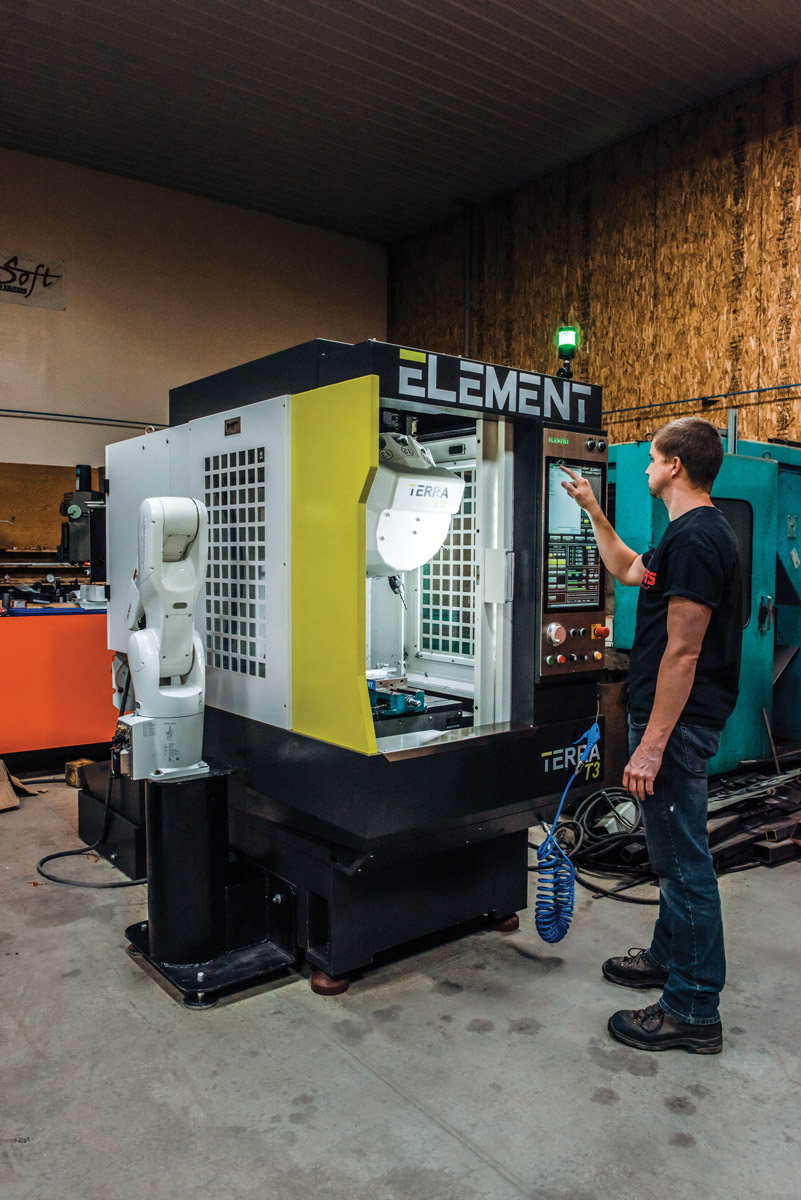
Tom Lamontagne, President/Chief Engineer at Element Machine Tools LLC, has been with the company for 2.5 years.
“I thrive on the challenge of finding a solution to problems that others say are impossible.”
— Tom Lamontagne
President/chief engineer, Element Machine Tools LLC
Besides his work with Element, Lamontagne is on the advisory committee for precision manufacturing at the Portland Arts and Technology High School, where he’s worked with students to create a CNC training controller for students.
Lamontagne hopes to build Element into a successful and sustainable business, “helping as many local and other manufactures on the way as possible.”
He still learns something new every day. “It’s the only way to stay current and have any hope of moving ahead in this faced-paced world. Starting out, I never thought this is what I would be doing, but here we are, designing and building manufacturing equipment.”
He says he’d tell young people starting today to never ever pass an open door.
“Every opportunity is worth a discussion,” he says. “And never accept failure as a result. If something doesn’t work out, it is a lesson in how not to do something. With that mentality you can never fail, and will find unlikely solutions to problems you never thought you could solve.” ■
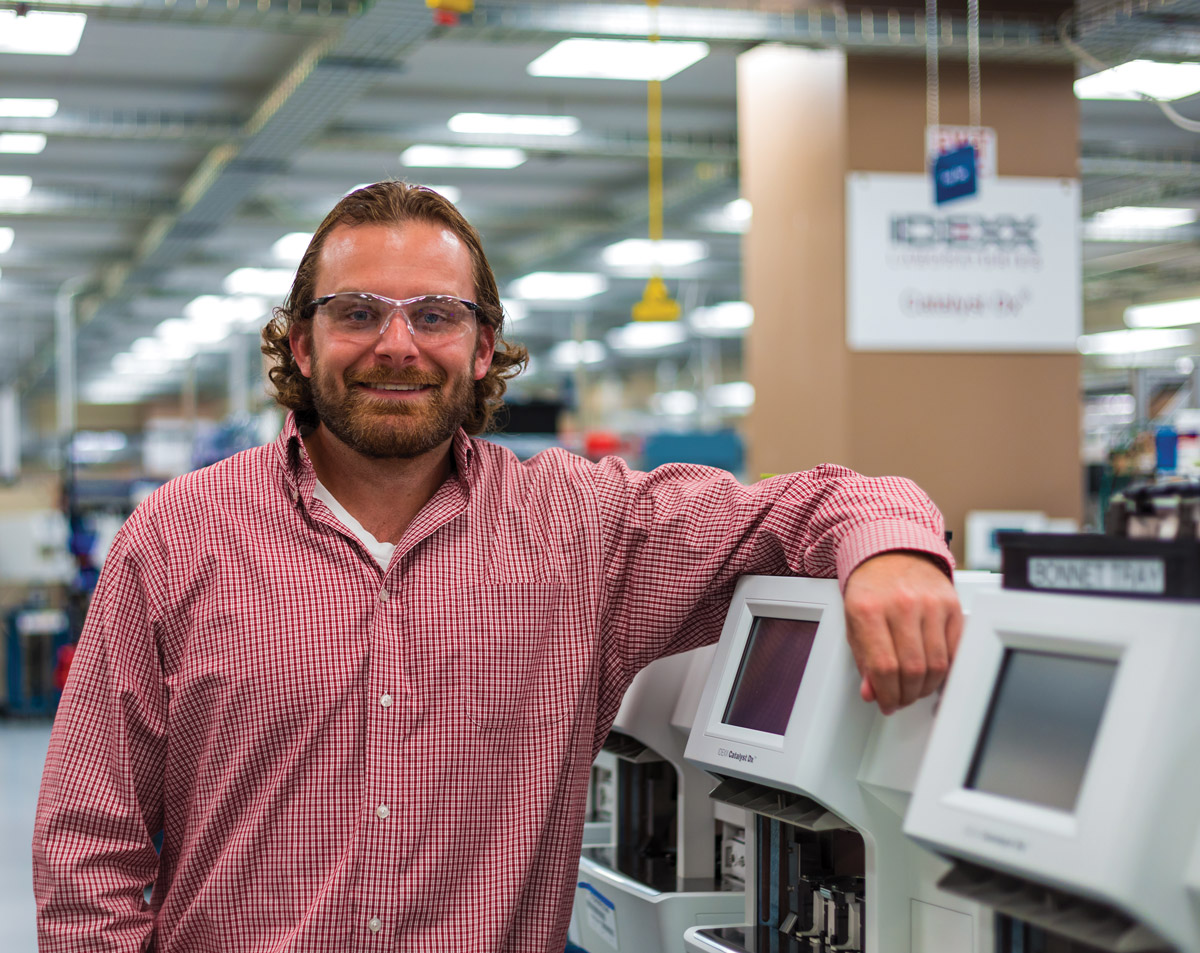
Eric Thorpe, process engineer at IDEXX Laboratories, is owner-operator at Woodboogah. Years at IDEXX: 5.5
Eric Thorpe
Eric Thorpe had worked as a sales engineer in Boston after graduating from Wentworth Institute of Technology with a mechanical engineering degree. In that job, he was exposed to all types of engineering.
“I gained an interest in manufacturing and decided I wanted to head down that career path,” he says.
“It can be fun to work with people from so many areas on one common task.”
— Eric Thorpe
Process engineer, IDEXX
owner-operator, Woodboogah
He picked IDEXX Laboratories in Westbrook because of its world-class manufacturing facility. The choice five and a half years ago to work for the veterinary and livestock products developer and manufacturer worked out well says Thorpe, 31, who is a process engineer for the company.
“Every day there is a new challenge,” he says. “It’s never the same routine day to day, and it requires you to think fast on your feet. If there is a problem in production, it is the highest priority to get it resolved ASAP. Sometimes that requires assembling groups of people from multiple different areas of the company that can include marketing, R&D, supply chain and others. It can be fun to work with people from so many areas on one common task.”
He says his experience at IDEXX makes him want to help create more engineering and jobs in Maine by continuing to work with local high school students to expose them to engineering and inspire them to follow careers in STEM (science, technology, engineering, and math).
He also has his own manufacturing company, which he started with his partner, Woodboogah, which designs, manufactures and sells cashmere knitwear. He’s working to complete his Six Sigma Black Belt certification, which would make him a master of proactive manufacturing principles meant to reduce errors and defects.
Over the years, he’s learned he doesn’t need to know the answer to every question. “You just need to know how to find the answer,” he said.
And that collaboration is a key to success. “I have found that working in cross-functional teams toward a common goal is the most effective way to solve a problem. The perspectives from people outside of your own group can vary drastically and sometimes that can be a good thing!
”He would tell young people today, “Persistence, if you have a goal take the right steps to get there and understand that when one door closes another one opens.” ■
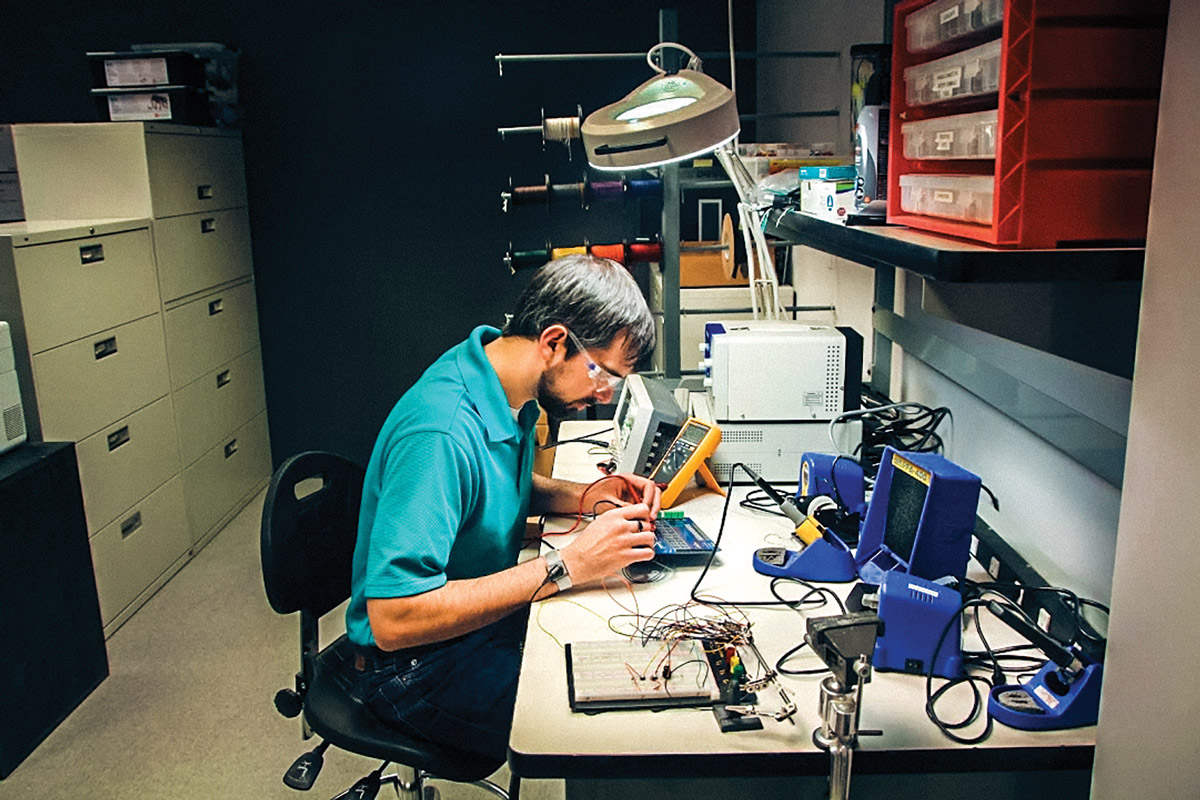
Kyle McClellan, partner at DISHER, has been with the company for 17 years.
Kyle McLellan
When Kyle McLellan’s wife was accepted into the residency program at Central Maine Medical Center last year, he’d been working for DISHER, a product development, talent attraction and business consulting firm, in Michigan for 16 years. He’d joined right out of college, and was the company’s first electronics engineer, helping to set up the electronics lab, establish a growth strategy and build the team.
He wanted to stay with DISHER, so he became the company’s first remote employee.
So far, it’s worked out well. “My job has morphed some from a very technical role back in Michigan, to a combination of technical work and business development out here.”
McLellan likes the variety. “One day I’m out visiting a prospective client and learning about their new idea for a product that won’t hit the shelves for another year or two, and then the next day I’m on the computer turning their design into reality,” he says. “The day after that I might be in the lab debugging a circuit board that’s malfunctioning, or writing code for a phone app.”
He’s also learned engineers must be social to succeed. “There’s an old stereotype that engineers like to hide away in a dark corner of the office and only come out to get more coffee,”he says. “That’s simply not true. A good design depends on getting the right people in a room and sharing ideas.” The company’s process includes brainstorming “to help ideate new ideas for internal projects, clients or anyone with an idea.”
“Make sure that nobody pigeonholes you into a specific job too early.”
— Kyle McLellan: Partner, DISHER
“I really enjoy participating in these sessions, because you get to see the creative side of engineering at its finest.” Networks like the Manufacturers Association of Maine “are integral to getting connected with the right people to help you bring the best possible design to the market.” Those who don’t network “end up late to market with a product that nobody wants to buy, because they failed to get input from industrial designers, marketing, manufacturing, or other engineers.”
McLellen has only been in Maine for a year, but he’s active in the community, particularly with robotics, serving on the Robotics Institute of Maine board of directors and chairing the Team Support Committee. He’s the FIRST Robotics Mentor for St Dominic’s Academy in Auburn, and he’s also a member of the Auburn Community Concert Band and was a Top Gun L/A Mentor for the 2017 season.
That flexibility extends to his advice to young people starting out in the job market. “Make sure that nobody pigeonholes you into a specific job too early,” he says.
That outlook doesn’t stop with the job search. “There are so many interesting directions to go in engineering these days that it’s hard to say where I’ll end up. One thing I’ve learned by working at DISHER is that I can’t see myself pinned down to working in a single industry…I personally thrive on variety, and I’d love to stay at the leading edge of product development.” ■
